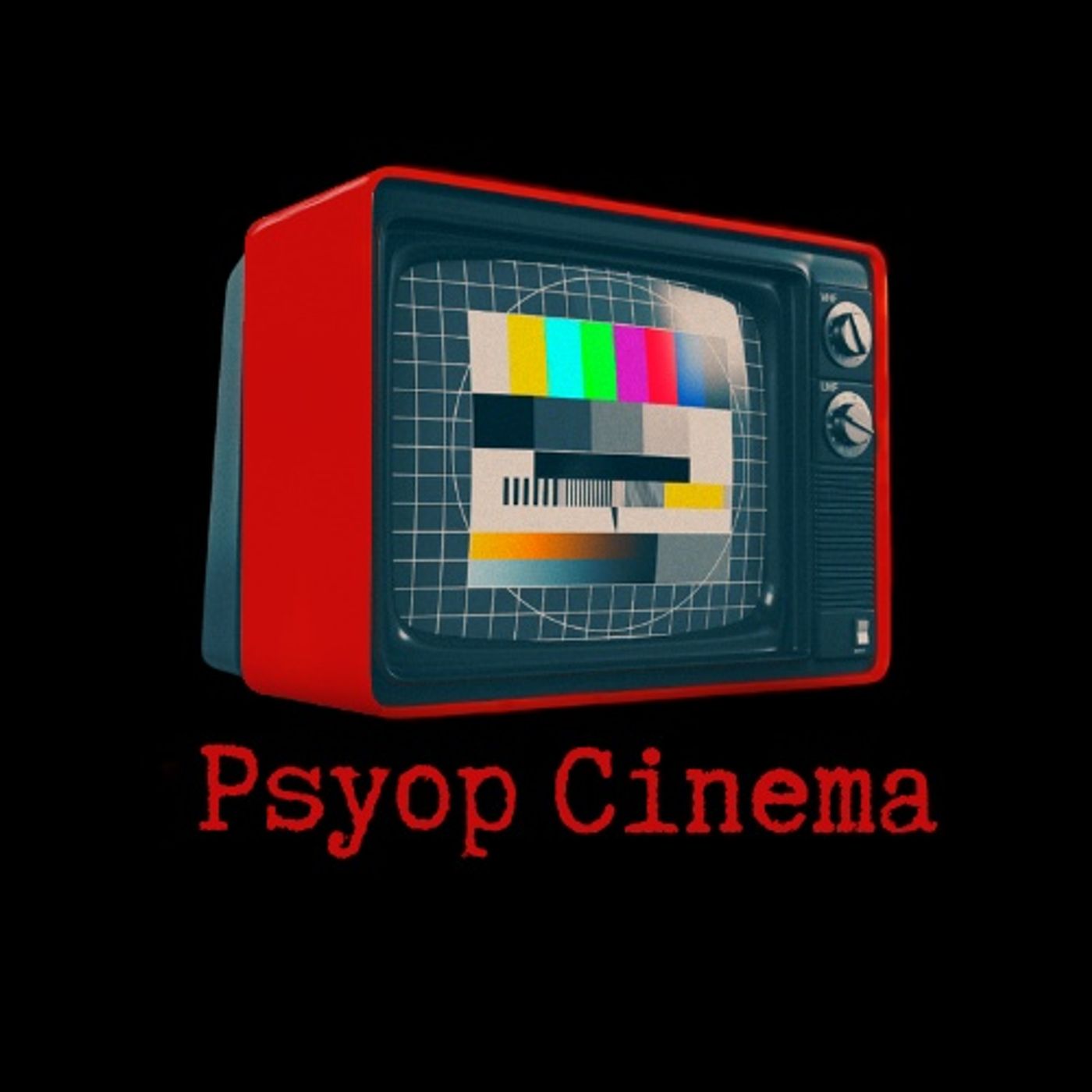

Psyop Cinema
Thomas Millary
Psyop Cinema is a podcast about the film industry and its intimate connections to mass manipulation, conspiracy, and the occult. Hosts Thomas Millary and Brett Carollo explore film from a deep politics perspective, demonstrating how the artistry of cinema combines with psychological and technological knowledge to engineer culture in subtle (and sometimes not-so-subtle) ways— making each of us the subject of the greatest mind control experiment in history.
Episodes
Mentioned books

Sep 9, 2024 • 11min
Intro to Oliver Stone (Preview)
A clip of Brett discussing Oliver's Stone's autobiography, Chasing the Light, from an extended Patreon-exclusive prelude to our upcoming Oliver Stone series. Check out our Patreon to hear Brett run through Stone's entire filmography (including many of his writer and producer credits) and give a very personal overview of Stone's life and work. https://twitter.com/CinemaPsyophttps://www.patreon.com/PsyopCinemahttp://psyop-cinema.com/https://linktr.ee/psyopcinemathomas-psyopcinema@protonmail.combrett-psyopcinema@protonmail.com

Sep 4, 2024 • 1h 32min
The Killer (Fincher 8)
In a new installment of their series on David Fincher, Thomas and Brett cover The Killer, Fincher's 2023 hitman thriller starring Michael Fassbender. They discuss Fincher's continued preoccupation with psychopathy and the dark self archetype, the film's hints concerning deep state conspiracies and the Thelemic religion of Hollywood, and its surprising thematic connections to Fincher's previous film, Mank. Just as Oppenheimer confirmed the show's conclusions about Nolan, The Killer totally validates the Psyop Cinema reading of Fincher.https://twitter.com/CinemaPsyophttps://www.patreon.com/PsyopCinemahttp://psyop-cinema.com/https://linktr.ee/psyopcinemathomas-psyopcinema@protonmail.combrett-psyopcinema@protonmail.com

Aug 23, 2024 • 2h 14min
True Detective Season 2, with Jasun Horsley and Steven DeLay
In this discussion, Jasun Horsley, known for his television insights, and Steven DeLay, an expert on media's cultural implications, dive into the underrated aspects of True Detective's second season. They analyze its complex themes of masculinity, family trauma, and societal corruption, contrasting it with the acclaimed first season. The conversation touches on the show's narrative shifts and the intricate connections to real-world events, revealing how these elements enrich the series’ portrayal of darker human experiences and moral ambiguities.

Aug 8, 2024 • 1h 19min
Song to Song, with Steven DeLay (Malick 8)
Thomas and Steven conclude their analysis of Malick's Weightless trilogy, looking at his 2017 film Song to Song. With this movie, Malick solidifies the Weightless trilogy's status as authentically Christian (specifically, Kierkegaardian) cinema. Using the setting of the Austin music scene, it delivers a positive message concerning the emptiness of hedonistic contemporary culture and how that lifestyle might be escaped. Thomas and Steven pay special attention to Michael Fassbender's role as a sinister record producer named Cook, Malick's version of a Miltonian Satan, a character that hints at the dark occult underbelly of the music industry.https://twitter.com/StevenDeLay4https://stevendelay.com/https://sunypress.edu/Books/L/Life-Above-the-Cloudshttps://twitter.com/CinemaPsyophttps://www.patreon.com/PsyopCinemahttp://psyop-cinema.com/https://linktr.ee/psyopcinema thomas-psyopcinema@protonmail.combrett-psyopcinema@protonmail.com

Jul 10, 2024 • 2h 13min
Civil War (2024) and The Second Civil War (1997), with William Ramsey and Sean McCann
We are joined by both William Ramsey and Sean McCann for a discussion that follows up on the analysis we did with them earlier this year of Leave the World Behind. Unpacking the surprisingly dull recent Alex Garland film Civil War, we also spend time talking about the much more lively film The Second Civil War, a 1997 made for TV movie directed by Joe Dante. The Second Civil War offers a satirical depiction of a heavily diversified America that is unable to cope with the complexities of globalization and is on the brink of violent conflict. We analyze the political ethos driving each film, considering their approaches to the ideal of journalistic neutrality, and discussing the extent to which Garland's film offers a pretense of being non-ideological. These films also give us the chance to offer our interpretations of recent American political developments and our thoughts about whether the events of such movies may represent our genuine future. https://www.williamramseyinvestigates.com/https://onegreatworknetwork.com/sean-mccannhttps://twitter.com/CinemaPsyophttps://www.patreon.com/PsyopCinemahttp://psyop-cinema.com/https://linktr.ee/psyopcinema thomas-psyopcinema@protonmail.combrett-psyopcinema@protonmail.com

Jun 26, 2024 • 2h 32min
True Detective Season 1, with Steven DeLay
Thomas and Steven discuss the first season of True Detective, analyzing its iconic depiction of occult conspiracy. They talk about the series' treatment of religion and philosophical pessimism, its approach to masculinity, and the thematic ambiguities of the show's conclusion. While expressing appreciation that this masterpiece of television includes so many positive notes, they also discuss the limitations of even well intentioned media depictions of organized ritual abuse. https://twitter.com/StevenDeLay4https://stevendelay.com/https://twitter.com/CinemaPsyophttps://www.patreon.com/PsyopCinemahttp://psyop-cinema.com/https://linktr.ee/psyopcinema thomas-psyopcinema@protonmail.combrett-psyopcinema@protonmail.com

May 30, 2024 • 1h 51min
Knight of Cups, with Steven DeLay (Malick 7)
Steven DeLay, film analysis expert, explores 'Knight of Cups' with Thomas, analyzing the film's gnostic and tarot references. They discuss Malick's Christian vision, Hollywood hedonism critique, and occult worldview subversion. Delve into complex family dynamics, authenticity, symbolism of tarot cards and narrative identity in Hollywood, suffering and salvation themes, Kierkegaard's religious stages, and actress connections in the film.

May 23, 2024 • 2h 31min
The Fury, Scanners, and Firestarter (on Jay's Analysis)
We joined our friend Jay Dyer on his show for a discussion about three films that deal with trauma-based mind control designed to cultivate psychical powers, particularly in children. Breaking down De Palma's The Fury, Cronenberg's Scanners, and Mark L. Lester's Firestarter, we talk about theta programming, the real history of government-sponsored psychical research, and the occult ideology that drives such experimentation. Films such as these program their audiences to venerate mutants and crave the catharsis of seeing their powers unleashed. https://jaysanalysis.com/https://twitter.com/CinemaPsyophttps://www.patreon.com/PsyopCinemahttp://psyop-cinema.com/https://linktr.ee/psyopcinemathomas-psyopcinema@protonmail.combrett-psyopcinema@protonmail.com

5 snips
May 16, 2024 • 2h 8min
Jasun Horsley on the Technology of Evil
Author Jasun Horsley discusses the technological body of evil, COVID-19 significance, occult divine child, Satan disagreements, and conspiracy theories involving Sam Harris and Ted Bundy.

Apr 21, 2024 • 1h 13min
To the Wonder, with Steven DeLay (Malick 6)
Thomas and Steven continue the Terrence Malick series, introducing a discussion of the Weightless Trilogy, which begins with To the Wonder (2012) and constitutes some of the most fully realized Christian cinema ever produced. We talk about Malick's Kierkegaardian inspiration and analyze the film's depiction of romance, family, and the search for God.https://twitter.com/StevenDeLay4https://stevendelay.com/https://sunypress.edu/Books/L/Life-Above-the-Cloudshttps://twitter.com/CinemaPsyophttps://www.patreon.com/PsyopCinemahttp://psyop-cinema.com/https://linktr.ee/psyopcinemathomas-psyopcinema@protonmail.combrett-psyopcinema@protonmail.com


